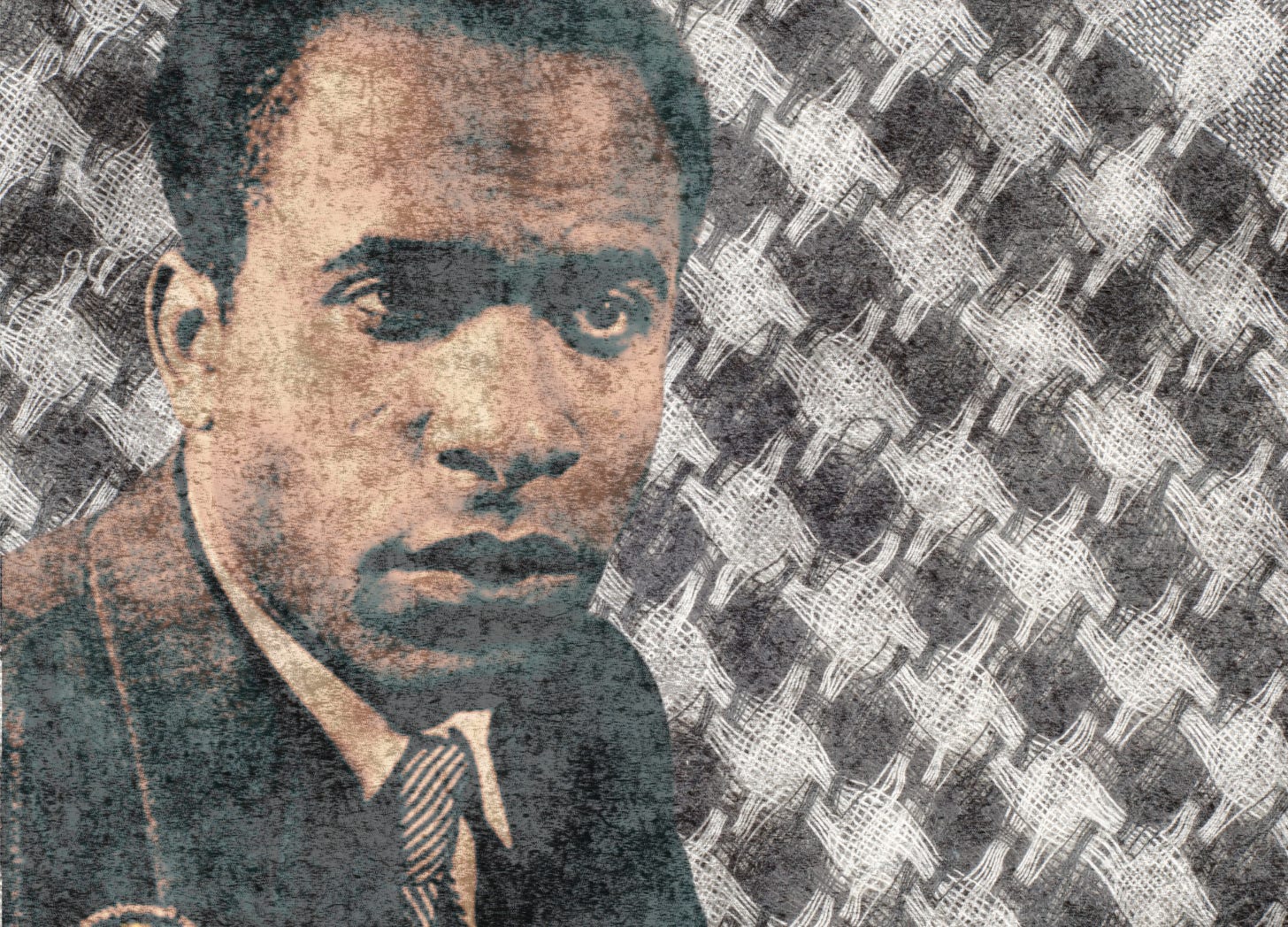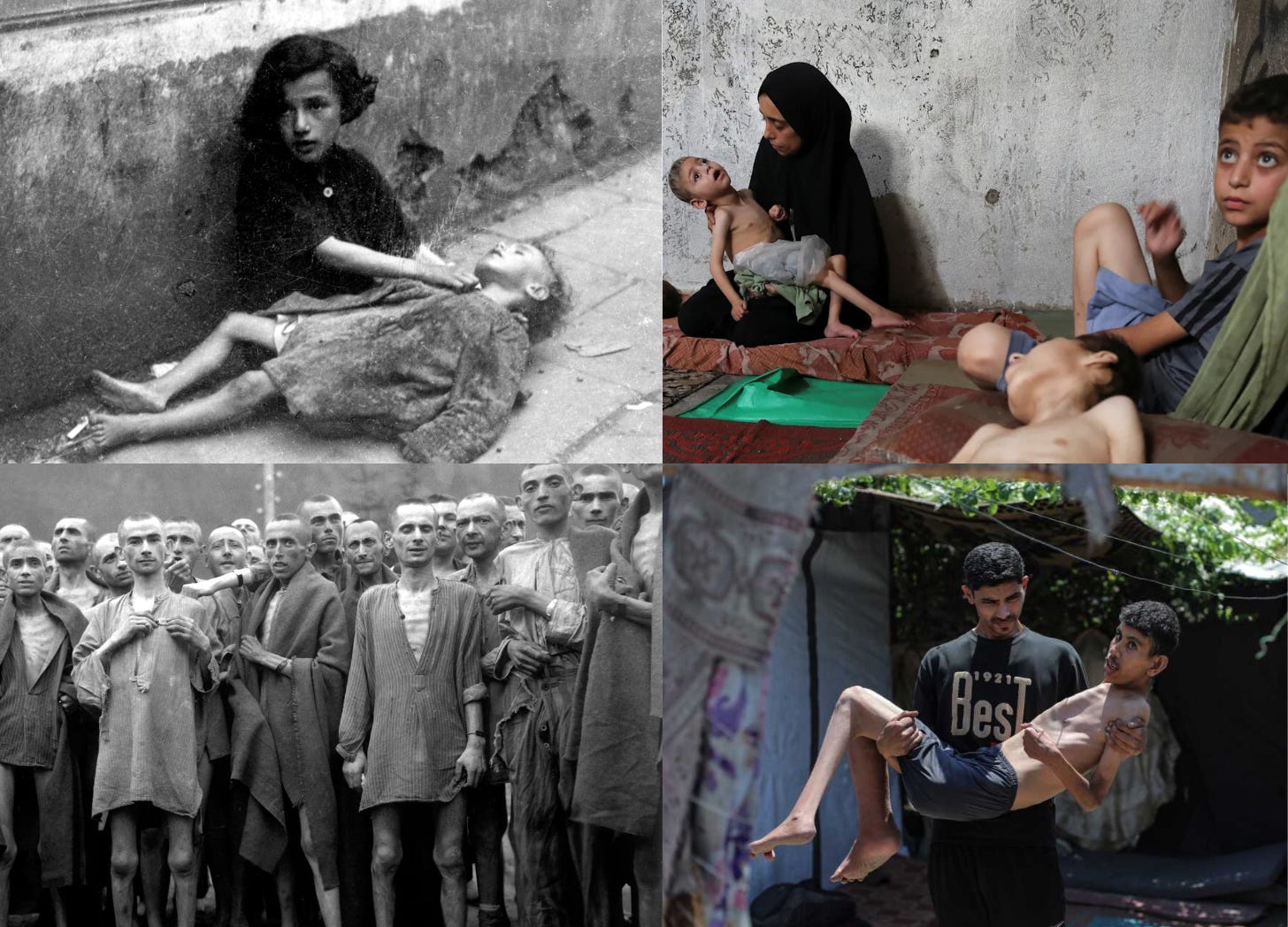The Age of Fanon, 2: Hunger and Starvation
By Bhakti Shringarpure. As Israel starves Gaza, Frantz Fanon's references to hunger and starvation reveal that these have always been tactical weapons within the arsenal of settler colonialism.
Our focus on Frantz Fanon continues as the world teeters towards a self-inflicted obliteration. Settler colonialism and white supremacy as ideology, intention and method has reached its zenith with Israel and its supportive Western friends committing genocide against Palestinians in the bright light of day. Reading Fanon these days is disorienting because on one hand, his diagnosis of a world plunged in colonial greed, racism, brutality and depravity is everywhere for us to see, and Fanon’s words are an oracle. Yet, on the other hand, his reflections on overthrowing the colonizer and his inspired understanding of resistance, empowerment and decolonization feel distant as we enter the darkest chapter in our contemporary history.
Israel is starving Gaza. This is a starvation so calculated and so deliberate that it ensures a slow and torturous death. Babies become too weak to even cry. Movement becomes impossible. Shame and humiliation become a constant emotion. It is not only a biological experience but a “collective social experience,” according to famine expert Alex de Waal. The trauma is lasting and acute, and societies takes several to recover from memory of the experience that is passed on to generations. “Those who inflict starvation are aware of this, they know that what they’re doing is actually dismantling a society,” says de Waal.1
Historically, starvation and hunger are some of the most violent weapons within the settler colonialism arsenal. It is not surprising that references to hunger, starvation and starved bodies appear frequently in Fanon’s work. He is not necessarily speaking of imposed famines here but is folding in starvation and hunger as legitimate techniques within the taxonomy of colonial violence.
“To starve” (affamer) a population in the Fanonian sense is part of the long game; it is an attempt to sever the colonized native’s connection to their land and their bread.
“For a colonized people the most essential value, because the most concrete, is first and foremost the land: the land which will bring them bread and, above all, dignity. But this dignity has nothing to do with the dignity of the human individual: for that human individual has never heard tell of it. All that the native has seen in his country is that they can freely arrest him, beat him, starve him: and no professor of ethics, no priest has ever come to be beaten in his place, nor to share their bread with him.”2
Settler colonialism with its unbridled greed for grabbing land systematically turns “the native town” into “a hungry town, starved of bread, of meat, of shoes, of coal, of light.” Even with the coming of independence, Fanon warns that the new leadership will only exacerbate the years of poverty, underdevelopment, and economic inequality. “The mass of the people struggle against the same poverty, flounder about making the same gestures and with their shrunken bellies outline what has been called the geography of hunger.”3 Here, he refers to Brazilian scholar and activist against hunger, Josué de Castro’s book The Geography of Hunger (1946) which explains that food shortages and ensuing hunger can no longer be viewed as natural phenomena but are indeed manmade.
In Fanon’s articulation of the chain of events, settler colonialism starts with the seizing of land which means the colonized are deprived of food. Hunger and starvation are inflicted on the population, and over time, they become part of the condition of the colonized. Hunger and starvation are primarily techniques of dehumanization. They strip the human beings of their sense of dignity bringing us back to the shame and humiliation that de Waal refers to. This dehumanization lasts for generations and ruptures history and memory of a place and people.
The imposition of devastating famine conditions is only the next logical step within the frame of hunger and starvation that are already embedded as part of the core violence of colonial rule. Mike Davis’ powerful work Late Victorian Holocausts: El Niño Famines and the Making of the Third World (2000) rounds up a staggering number: 30-60 million deaths were caused by famine in the 19th century, all attributed the nexus of colonialism and capitalism.
Systemic underdevelopment and stripping of dignity is an anchoring element of Israeli settler colonialism. Gaza was placed on a strict calorie count two decades ago when Israel imposed complete blockade of food and other goods entering Gaza starting in 2007. This “collective punishment” ensured that food allowed to enter was strictly rationed so as to remain just on the edge of malnutrition levels in order to avoid creating a legitimate humanitarian crisis.4
Thus hunger and starvation have been openly used as weapons against Palestinians from the very beginning. Nazis used this same method to exterminate Jews and despite the important adage that “victims becomes victimizers,” Jewish Israel starving Gazans becomes a shocking absurdity to contend with. Images of starving Palestinians now stack up alongside the archive of emaciated prisoners in concentration camps whose food was tightly controlled under Hitler’s plan to starve over 1.2 million Jews.
These images and these comparisons have become so evident that mainstream media has now rushed to publish images of starving Palestinians. They continue to do it with caveats and disclaimers, and Israeli propaganda still continues to be cut and pasted into the articles. Most importantly, there is absolutely no concerted effort—no strikes, mass resignations, urgent bills, massive boycotts—that can resoundingly effect change among the powerbrokers and alter the architecture of this disaster.
Many of us are experiencing a sense of powerless that is simply profound. All I can say once again is that feelings of despair and hopelessness still remain a luxury for us and we cannot give in to them. For starters, speaking up about this still matters. Don’t let the occasional mainstream media article fool you. As the media pretends to break the silence on a genocide they themselves brazenly perpetrated, they are also actively attempting to change the narrative by generating debates on genocide itself. This is just a push towards genocide denial.
Please consider contributing to The Sameer Project not just once but make this part of your giving practice since this genocide is showing no signs of stopping. We will soon enter the third year of this.
It cannot be business and life as usual. Don’t let them win. Keep being a killjoy and interrupt everything.
Love and solidarity❤️🔥
Bhakti Shringarpure
Recent publications: Focus on Fanon at 100
Starvation in Gaza is destroying communities – and will leave generational scars by Emma Graham-Harrison https://www.theguardian.com/world/2025/jul/23/starvation-in-gaza-is-destroying-communities-and-will-leave-generational-scars
Constance Farrington’s translation of the chapter “On Violence” in The Wretched of the Earth by Frantz Fanon http://hyle.mobi/Reading_Groups/Concerning%20Violence,%20Frantz%20Fanon/
"The Pitfalls of National Consciousness" is the third chapter in Frantz Fanon's The Wretched of the Earth. Available here: https://www.marxists.org/subject/africa/fanon/pitfalls-national.htm
“Israel used 'calorie count' to limit Gaza food during blockade, critics claim” The Guardian, October 2012. https://www.theguardian.com/world/2012/oct/17/israeli-military-calorie-limit-gaza




